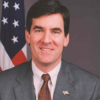Mitchell Reiss

Mitchell Reiss
Mitchell B. Reissis a senior American diplomat who is now the President and CEO of the Colonial Williamsburg Foundation in Virginia. Immediately prior to this post, he served a tenure of four years as the 27th president of Washington College in Chestertown, Maryland. He served as Director of Policy Planning at the United States Department of State under Colin Powell. He also served as the United States Special Envoy for Northern Ireland, with the diplomatic rank of Ambassador, until stepping...
NationalityAmerican
ProfessionDiplomat
CountryUnited States of America
Everyone I have spoken with so far recognises the need for the IRA to respond positively and every has said sooner is better than later and I think there is some concern if it does continue to delay much longer that the situation isn't going to remain the same.
They would rather the United States play the bad cop, and they could play the good cop - let the United States do all the heavy lifting here.
The Nuclear Suppliers Group is one area the president highlighted in his speech that's extremely important and that needs to be improved.
It's up to Kim Jong Il to make that decision, and we can't make that for him.
Then the final thing is enforcement. What happens when we actually catch somebody who has violated international law, rules, and regulations?
Or perhaps they didn't share it at all, but they were happy that the United States wanted to go ahead and deal with North Korea, that was fine.
First of all we have to recognize that despite all the problems - and in some cases failures - that this regime has been much more successful, much more resilient, than people had anticipated.
First of all, I think the situation today is different. We're in a different place than we were in '93, '94.
Sometimes we tend to focus more on the personalities and the conflicts, and it really caricatures the issues.
All the options are pretty unattractive right now except for continuing to talk.
The format's better because it gives us a much stronger hand to play when going to the North Koreans unified, with our allies and partners in the region, all of us saying the same thing: telling them their current course is unacceptable.
And it's time for Sinn Fein to be able to say that explicitly, without ambiguity, without ambivalence, that criminality will not be tolerated.
And it's not surprising that there should be disagreement - it'd be a little surprising if there was complete consensus on any foreign policy issue.
And I think they realize that the other five countries are lined up against them, because all five are opposed to North Korea having nuclear weapons.